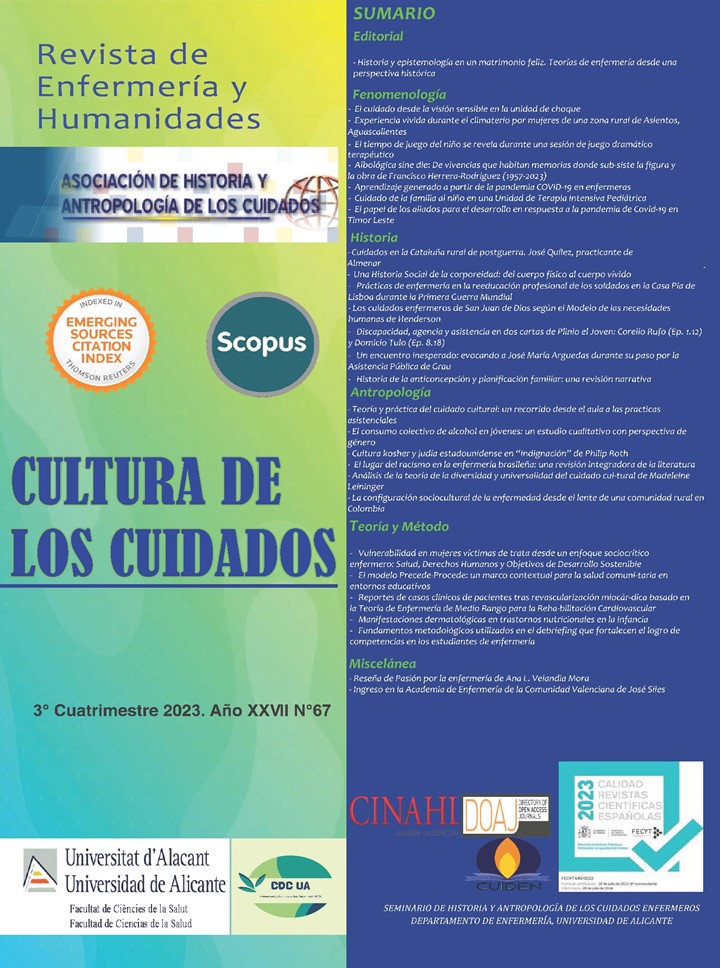Cultura kosher y judía estadounidense en “Indignación” de Philip Roth
DOI:
https://doi.org/10.14198/cuid.20621Palabras clave:
Kosher, judío, cultura, américa, Estados Unidos, derecho, religiónResumen
Objective: Abstract: “Kosher” is a word used to illustrate the food laws of Jewish people. It’s a traditional Jewish law for food. For Jews, it’s more than food
consumption with safety. It’s regarding religious beliefs and traditions. Jews follow proper guidelines of Kosher and give the compulsion to food to be reckoned Kosher.
The English word “Kosher” is derived from the Hebrew root “Kasher”, which means to be pure, proper, or suitable for consumption. Kashrut is a charter that renders the foundation for kosher dietetic rule and is established inside ‘Torah’ which is a Jewish sacred book. Kosher dietetic rules are including all and produce a strict structure of rules and regulations which gives a sketch of foods allowed or prohibited. It also determines how foods allowed should be made, refined, and fixed before eating. The paper illustrates kosher law and food among American-Jewish people and their determination
towards their religious beliefs in American land, which is not their motherland, with analysis from Philip Roth’s novel Indignation. This paper also ascertains
Jewish culture into the outlook of American culture which ends with a cultural clash referring to historical consequences.
Citas
Aldama, F. L. (2011). Putting a Finger on That Hollow Emptiness in Roth's Indignation. Philip Roth Studies, 7(2), 205-217.
Duban, J. (2011). Written, Unwritten, and Vastly Rewritten: Meyer Levin's In Search and Philip Roth's “Defender of the Faith,” The Plot Against America, and Indignation. Philip Roth Studies, 7(1), 29-50.
Duban, J. (2015). From Negative Identity to Existential Nothingness: Philip Roth and the Younger Jewish Intellectuals. Partial Answers: Journal of Literature and The History of Ideas, 13(1), 43-55.
Fludernik, M. (2003). Diaspora and multiculturalism: Common traditions and new developments (Vol. 66). Rodopi.
Grossman, S., & Haut, R. (1992). Daughters of the King: Women And the Synagogue (A Survey of History, Halakhah, and Contemporary Realities). Jewish Publication Society.
Haas, Michael. (2015). Cultural Pluralism. Immigration to the United States. Print. https://books.google.co.in/books?hl=en&lr=&id=voCm84JOZ9EC&oi=fnd&pg=PR9&dq=kosher+culture&ots=q8BgkoSr5B&sig=M9N02dLH396rkmikcrCP_KF_WOA&redir_esc=y#v=onepage&q=kosher%20culture&f=false.
Hill, Ansley. (January 25, 2019). Kosher Food: Everything You Need to Know. https://www.healthline.com/nutrition/what-is-kosher#bottom-line.
Jun-yu, L. I. (2010). Escaping, Rebelling and Being Destroyed: the Conflict of Father-Son in Indignation. Journal of Heilongjiang College of Education, (3), 53.
Jun-yu, L. I. (2010). The Triangular Relationship in Philip Roth's Indignation. Journal of Mudanjiang Normal University (Philosophy Social Sciences Edition), (2), 20.
Kimmage, Micheal. (2012). In History’s Grip: Philip Roth’s Newark Trilogy. Stanford University Press, Stanford, California.
Lirca, C. A. (2013). “To Be or Not To Be?”–On Philip Roth’s Jewish-Americanness. Studia Universitatis Petru Maior. Philologia, (15), 162-166.
Lytton, T. D. (2013). Kosher. Harvard University Press.
Masoudi, G. F. (1993). Kosher food regulation and the religion clauses of the first amendment. The University of Chicago Law Review, 60(2), 667-696.
McKinley, M. (2014). Blood, tradition, and the distortion of ritual in Philip Roth's indignation. Studies in American Jewish Literature (1981-), 33(2), 186-201.
Mildorf, J., & Kinzel, T. (2016). Multisensory Imaginings: An Audionarratological Analysis of Philip Roth's Novel Indignation and its German Radio Play Adaptation Empörung. CounterText, 2(3), 307-321.
Neusner, J. (2002). The Halakhah: historical and religious perspectives. Brill.
Rosenberg, Kapnek Shelley. (2004). Challenge and Change: History of the Jews in America. Behrman House, Inc. Springfield, New Jersey. www.behrmanhouse.com. Print.
Roth, P. (2010). Indignation. Gyldendal A/S.
Roth’s, P. (2018). After the Fall. PHILIP ROTH STUDIES, 1.
Rubin-Dorsky, J. (2001). Philip Roth and American Jewish Identity: The Question of Authenticity. American Literary History, 13(1), 79-107.
Shternshis, Anna. (1923- 1939). Soviet and Kosher: Jewish Popular Culture in the Soviet Union. Indiana University Press. Print. https://books.google.co.in/books?hl=en&lr=&id=voCm84JOZ9EC&oi=fnd&pg=PR9&dq=kosher+culture&ots=q8BgkoSr5B&sig=M9N02dLH396rkmikcrCP_KF_WOA&redir_esc=y#v=onepage&q=kosher%20culture&f=false.
Stern, Marc D. (1990). Kosher Food and the Law. Judaism New York. Volume 39, Issue 4. Print. https://search.proquest.com/openview/3a4474f3cdac9ef7d3e81191c992be93/1?pq-origsite=gscholar&cbl=6969.
Weinryb, B. D. (1957). Jewish Immigration and Accommodation to America: Research, Trends, Problems. Publications of the American Jewish Historical Society, 46(3), 366-403.
Yu, P. (2014). Writing Historical Memories in Philip Roth's Indignation. Contemporary Foreign Literature, (4), 2.
Zollman, J. (2011). Jewish immigration to America: Three waves. My Jewish Learning.
Descargas
Estadísticas
Publicado
Cómo citar
Número
Sección
Licencia
Derechos de autor 2023 SARIKA TYAGI, VASUNDHARA VASUNDHARA

Esta obra está bajo una licencia internacional Creative Commons Atribución 4.0.






